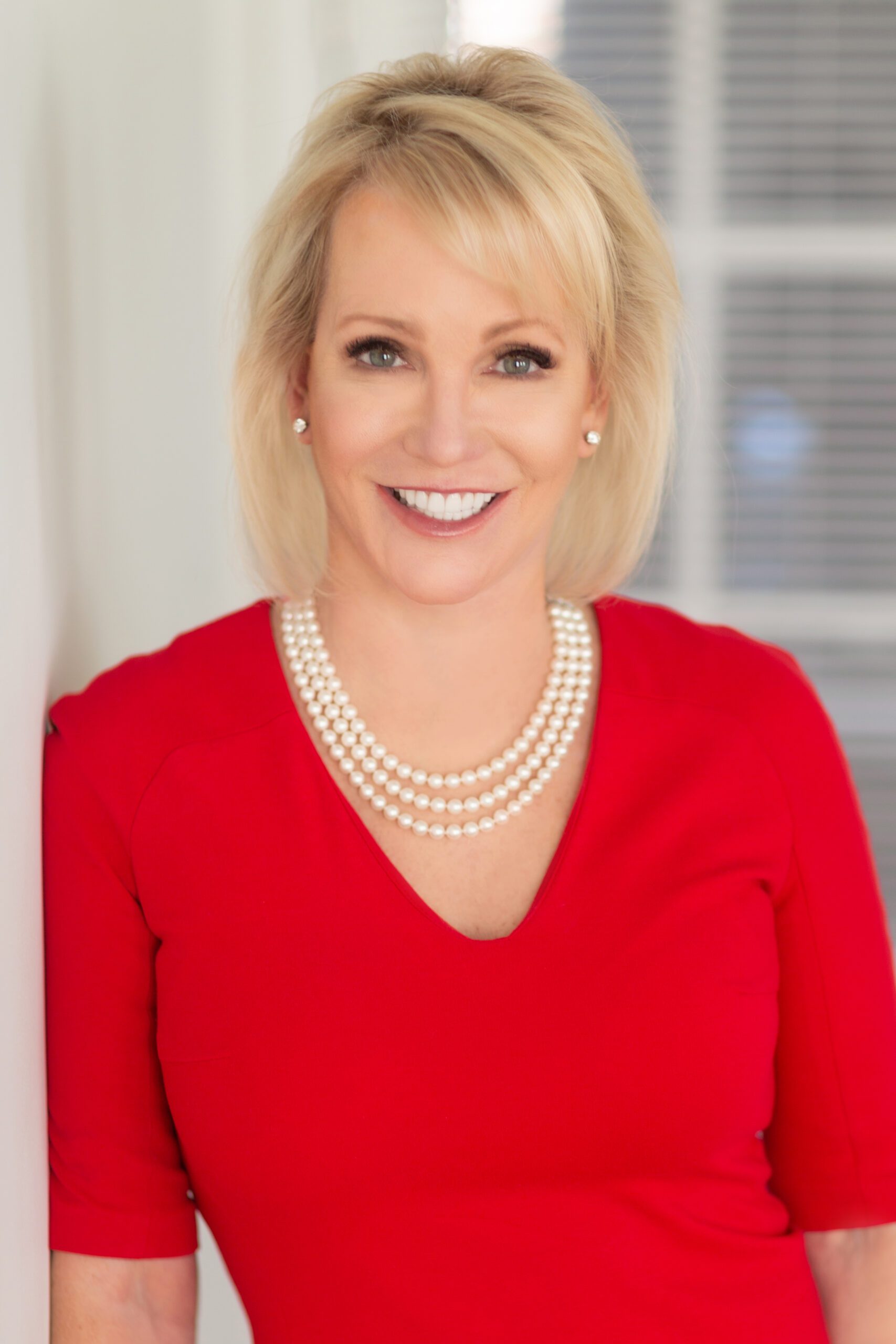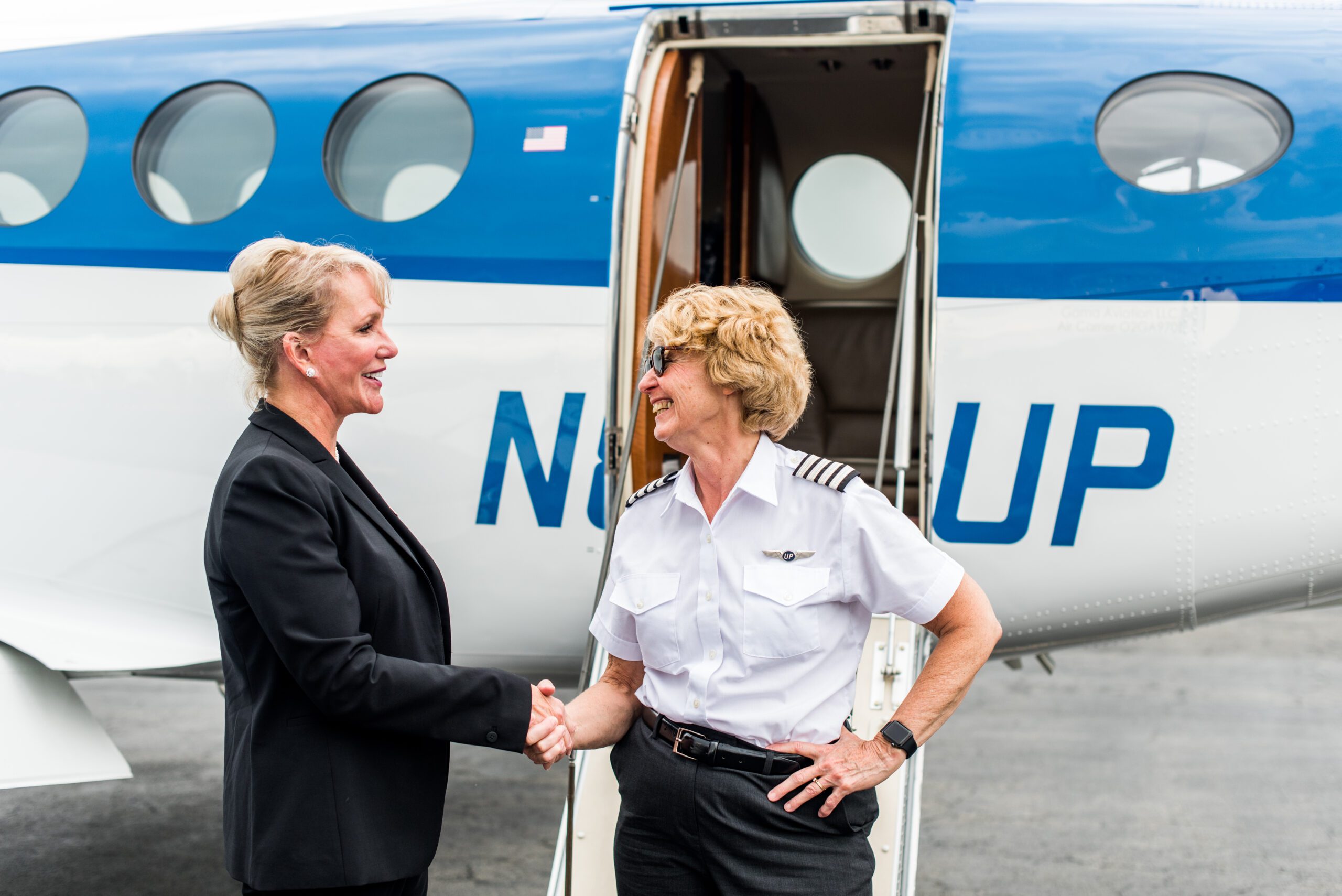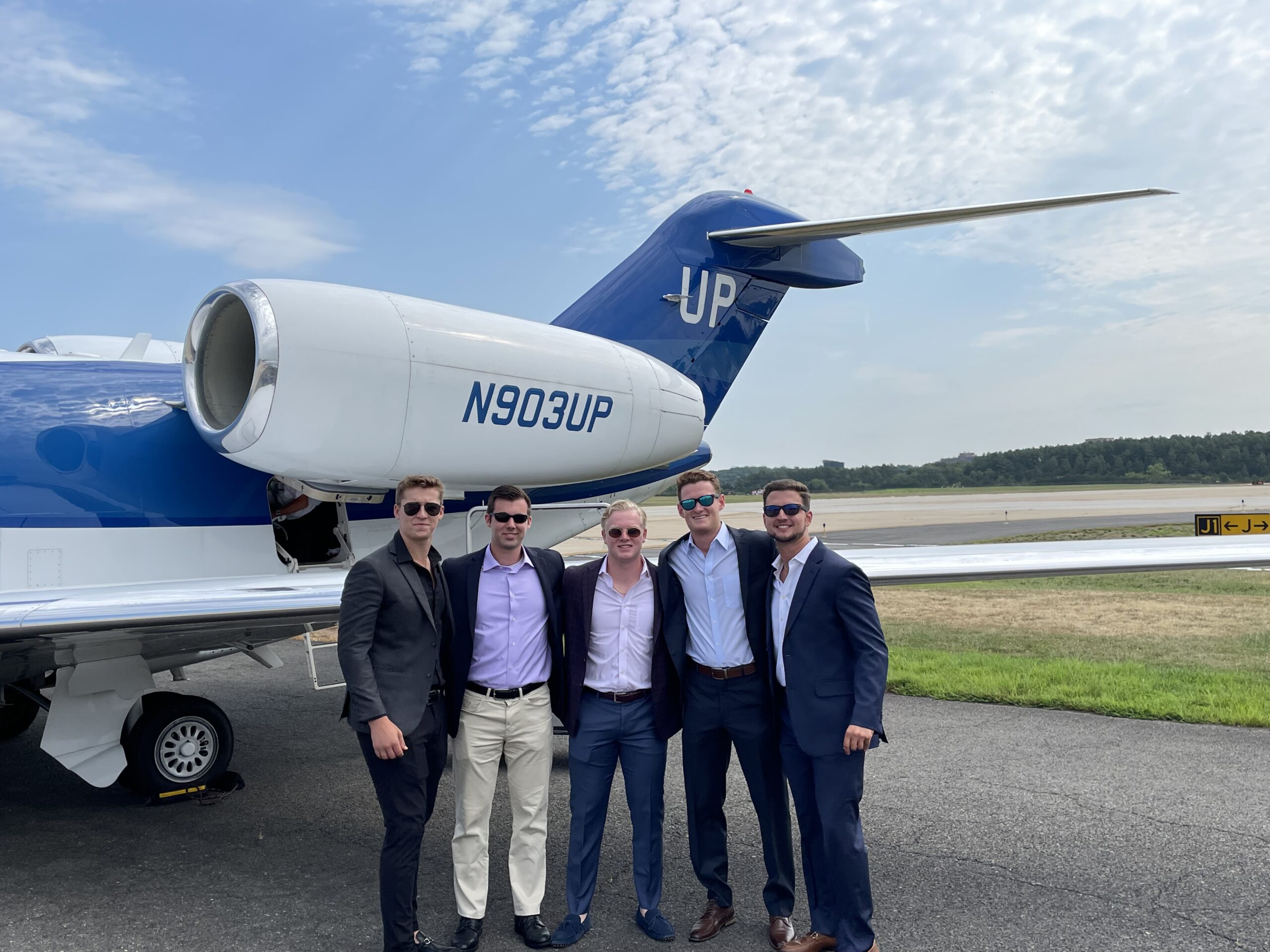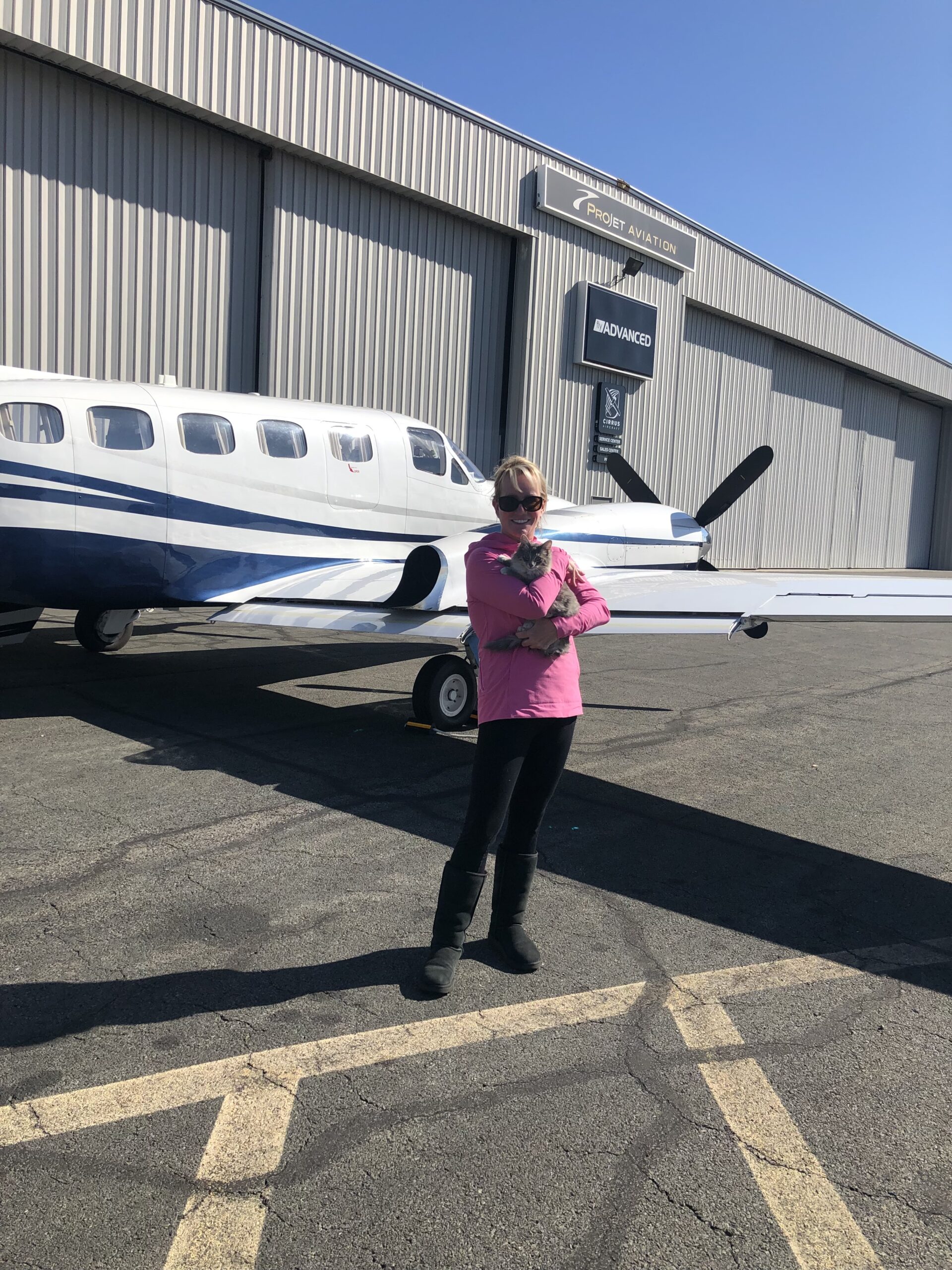
When you think of the private aviation industry, the word “accessible” rarely comes to mind ⏤ but Wheels Up is looking to change that, especially in the Washington, D.C., area.
Founded in 2013, Wheels Up provides on-demand private aviation globally via corporate and individual membership programs and charters. Thanks to recent growth over the past few years ⏤ which included acquisitions, going public in 2021 and a strategic partnership with Delta Air Lines ⏤ the company’s services are expanding to provide a true door-to-door experience. Plus, its market runs the gamut from individuals to corporate industry, government contracting and civil organizations.
The company’s mission has always been the same. Its first founder and CEO Kenny Dichter, who had been in aviation for many years, “had this idea that private aviation should be accessible to anybody who might like to fly private,” the company’s Chief Legal Officer Laura Heltebran told WashingtonExec.
The membership program approach reduces the financial barrier to entry. Over the years, Wheels Up grew from an individual play to becoming a great provider to corporations that needed aviation services.
Heltebran, who joined the company in December 2020, was there for some of Wheels Up’s most significant milestones. Wheels Up went public in July 2021, and closed its acquisition of Air Partner in April 2022 ⏤ which accelerated its global reach.
As a D.C. native who made her name in tech and now claims experience in three major industries, Heltebran’s unique background, professional journey and diverse perspective well-equipped her for Wheels Up’s growth and trajectory.
* * *
Heltebran jokes that while she landed in private aviation and leveraged Wheels Up’s services (a story she’ll get into later), she wasn’t raised in a family that could afford to fly privately. And yet, her upbringing was certainly rich with experience.
Heltebran was born in downtown D.C., but in elementary school, her stepfather was recruited by the Army Corps of Engineers to be the first safety engineer in Riyadh, Saudi Arabia. There, he oversaw the significant amount of construction going on in the country.
Heltebran spent most of her formative years in Saudi Arabia, not returning to the States until 10th grade.
“It was a great experience,” she says. “I’m so grateful for the exposure.”
Heltebran attended an international school, and her classmates were from all over the world. She describes the curriculum as very advanced, which benefited her when she came back to the States. The culture, she says, was warm and inviting, and she created long-lasting relationships with many of the expats.
Heltebran rode horses kept in stables owned by the royal family, played volleyball and swam, and learned from a curriculum much wider than what most are accustomed to in the U.S.
“When we learned history, it was truly world history,” she says. “It was never through a lens that was specific to any one country.”
When they learned of religion, they learned about the histories of all religions ⏤ not just the demographically prominent ones.
“My beliefs may not be your beliefs and yours may not be not mine, but as long as we’re good people trying to live good lives and be good to each other, we should be respectful of it,” she says.
This mutual respect for differing opinions is often lost in the U.S., Heltebran says, especially because of rising political division.
“I really gained that perspective, which I don’t think I would have gained had I grown up here,” she says. “I credit that upbringing with shaping a lot of who I am today.”
English, history and government affairs came easily to Heltebran. Despite her strong math skills, a discouraging high school teacher told her she was terrible at math and advised her to shift focus. This was solely because Heltebran arrived at the right answers in her own, unique ways. While she sometimes wonders what could have been, she remained drawn to reading comprehension and academics that led her to law.
Still, she didn’t always have a clear path.
“I wanted a job that saved the world,” she says, like psychology. Yet, her parents influenced her to take the English-to-law school track. “I didn’t always know what I wanted to be, but I think I landed right where I should,” she said.
Heltebran graduated from George Mason University with a Bachelor of Arts degree, working three jobs to afford tuition. She then worked in sales at Xerox Supplies for six months before taking the LSATs. Following that, she got her Juris Doctor degree from George Mason University’s Antonin Scalia Law School.
Working in school motivated Heltebran to ultimately land a job that could support her.
“I wasn’t focused on uber wealth,” she says, “but I wanted to be financially secure.”
She ran out of money at the end of her second year in law school and received permission from the dean to attend night classes instead of adding an extra year to her studies.
“I finished my third [and final]year at night, another period of hard work that motivated me to land in a place where I just had some good security,” she says. She joined MCI Communications, a small company that took down the Ma Bell Monopoly. After working as a law clerk, her mentor John Frazier at MCI took a chance on Heltebran.
“I’ll be forever grateful that he walked down the hall that day and to my shock said, ‘We all like you and we’d like you to stay, and we hope you’ll consider it,’” Heltebran recalls.
MCI offered her a job as a litigator, and she stayed in-house as a corporate attorney. She was thrown right into the pool and given cases off the bat. This experience made a big difference in Heltebran’s career.
“That’s how I found myself in tech,” she says. “I just happened to be at the right place at the right time.”
* * *
From there, Heltebran pursued opportunities as they came. She worked at MCI for 10 years surrounded by impactful mentors and colleagues. Then, from 1998–1999, she served as senior technology counsel for the Coca-Cola Company. After starting a family in 2000, she took her foot off the gas a bit. However, a former Coca-Cola colleague recruited Heltebran as Commercial Counsel of Contracts ⏤ a job that accommodated her new role as a mother.
Heltebran spent six years at Turner Broadcasting and AOL, at the time both were Time Warner subsidiaries, honing her skills before moving on to a purer tech play at Affiliated Computer Services, a Dallas-based outsourcing company now known as Conduent. There, she met Bill Deckelman, the general counsel of Affiliated Computer Services. After working together for three years, Deckelman moved to Computer Services Corp. in the D.C. area, and Heltebran soon followed.
“CSC was a wonderful opportunity to work for Bill again,” she says.
This job also brought her closer to working in a company’s HQ, considering she spent the last few years prior commuting between D.C. and Dallas. She served as deputy general counsel and director of Americas, Legal for CSC before being recruited to Hewlett Packard Enterprise as senior vice president to lead general counsel of the Enterprise Services business unit.
Within three months of joining, Hewlett Packard Enterprise made the decision to spin off its Enterprise Services unit to merge with CSC — where Heltebran had just worked — to form DXC Technology, with Deckelman as general counsel.
However, before Heltebran could return to her previous company, Hilton Worldwide recruited her as senior vice president and its first-ever deputy general counsel, marking her entry into the hospitality industry. Heltebran spent four years at Hilton under President and CEO Chris Nassetta, praising the leadership, legal team and the value of adding experience in a new industry.
When COVID-19 hit, Hilton decided to significantly reduce its ranks, including Heltebran’s position. She spent time with her kids to figure out her next move. Among a few other offers and unsolicited recruits at the time was Wheels Up, and it piqued her interest.
“The first thing I said to the recruiter when we had the Zoom interview was, ‘They do know that I’m not an aviation lawyer, right?’” Heltebran says. Turns out, Wheels Up already had an aviation expert. It was looking for a candidate with Heltebran’s public company skillset.
Ultimately, she loved the idea of taking a company public.
“It was a great opportunity and a challenge,” she says. She didn’t know much about private aviation, but the company wanted to be a tech play, aspiring to build an agnostic platform like Amazon, where it could sell its products alongside others’ offerings.
* * *
After Heltebran joined in 2020, Wheels Up quickly expanded. The acquisition of U.K.-based Air Partner added a global footprint Wheels Up previously hadn’t had.
“Not only did we become a global provider, but it added a great deal of charter,” she says. “That combination opened us up to the world and made us more of a seamless private aviation play.”
In 2023, with former Delta board member George Mattson as new CEO, Wheels Up expanded its partnership with Delta Airlines. This collaboration grew Wheels Up’s end-to-end program, allowing customers to book Delta and Wheels Up for their entire journey. This partnership also brings benefits to members of both companies.
As chief legal officer of one of the first private aviation companies to go public, Heltebran says she often feels like a Swiss Army knife, doing work that isn’t hers to do but needs to be done ⏤ as others in the company do as well.
“We all pitch in and try to row in the same direction,” she adds.
Her global experience also benefited Wheels Up’s recent growth. Heltebran managed global teams in her last three jobs, so she felt calm when Wheels Up all of a sudden went global.
“I’m accustomed to having huge teams. I’m accustomed to facing global challenges,” she says. And while learning aviation was a bit intimidating, she felt confident in every other aspect of the job. “I’m built for this,” she says.
Heltebran understood the aviation industry’s issue with gender diversity, a field predominantly male, especially among crew members. This was similar to the tech industry when she entered it in the 1990s.
“Tech was definitely skewed more toward men than women in higher positions,” she says. “That has changed since ⏤ I do think the tech industry has leveled out at least somewhat. But back then, she felt a difference in how men and women were treated and how they behaved at corporate functions.
Heltebran’s approach as a young woman in tech was to say, “Anything you can do, I can do better, and so I’m going to compete and earn the seat at the table,” she says. She also leveraged the support and uplifting of mentors around her.

Heltebran is committed to closing the gender gap and opening opportunities for everyone, leading by example. Her team is more than 60% female. Wheels Up also supports Heltebran’s participation in organizations outside the company, like Women in Aviation International. Girls in Aviation Day is also a big volunteer moment for Wheels Up. Additionally, the company supported Heltebran’s appointment as a member of the advisory board of Women Leading Travel and Hospitality ⏤ another organization that helps women network in the industry.
Ultimately, “We’ve got to start telling girls that they can, earlier,” Heltebran says.
* * *
Inclusivity, accessibility and forward-thinking seem to be trending ideologies for the company. Wheels Up offers various membership models, like a program that allows customers to deposit funds of varying levels and with each deposit amount comes a certain set of benefits. Those include booking closer to your travel date, accessing a better hourly rate and so on.
And rather than having to “buy in” with other companies or partners and own a share of a plane, Wheels Up’s model is on-demand, meaning customers pay only for what they need, whether it’s a small plane for a couple of people (pets included) or a mid-size or super jet for a large crew.
The company is also creating an end-to-end seamless service model for flying. With Delta as a partner, an executive could fly from their home city of Santa Barbara, California, to Los Angeles on a King Air, then on a Delta wide-body plane to London for a work meeting, then charter a flight to the South of France to meet up with their family for a vacation. That entire trip can be done via their Wheels Up membership. (There are even door-to-doc experiences via a partnership with seaplane operator Tropic Ocean Airways.)
These benefits ring true for the D.C. area, too. It’s a key hub for any airline operation and Wheels Up’s East Coast piece. Wheels Up has a large presence in Atlanta (its HQ), Florida and New York, so D.C. is the logical central point, Heltebran says. The company’s planes regularly fly to and from the D.C. area, using all airports, a significant operation given the fivefold higher number of private airports compared to commercial ones, she adds.
“We have lots of members that utilize our services who either live here or come through here frequently,” Heltebran says.
Wheels Up customers span state, local and federal government, and it has a robust GovCon business run by Simon Moore, who lives in the D.C. area.
“We’ve worked for 28 years with the White House Press Corps for aircraft charter and logistics,” Heltebran says. Wheels Up has a General Services Administration schedule, having been vetted by the government to offer its services.
And while it may seem more feasible for organizations or companies to use private aviation services, Heltebran says individual travel is more accessible than you’d think.
She uses herself as an example. After calculating the cost for a family of five to six to fly first class, she says Wheels Up wasn’t much more.
“Whether you’re flying for business reasons or flying for personal reasons, we can do it all, from all of the airports in the area,” she says.

Wheels Up executives rarely use the company’s planes, prioritizing members and corporate clients because of tax implications. Yet, Heltebran made an exception for her son’s 21st birthday in 2021, treating him and four friends to a Bahamas trip.
They flew out of Dulles International Airport and the boys all dressed up in suits and full of excitement. It was a “wonderful memory,” Heltebran says.
“Going through customs that way, I’ve never had such an easy experience,” she adds. “That was my first opportunity to use the company services for my family.”
* * *
Heltebran’s experience at Wheels Up, including pursuing her pilot license, has been transformative. Her journey began during a photoshoot at Leesburg Airport in Virginia with Stephanie Chung, then Wheels Up’s chief growth officer, for Women in Aviation International magazine, alongside company pilots. Chatting with the photographer, also a pilot instructor, sparked her interest in flying as she watched planes take off and land. He offered her an adventure flight, which she enjoyed, leading to her decision to learn to pilot.
“It really has given me a much better appreciation of what our crew needs to do before, during and after a flight to keep things safe, which is a top priority for us,” Heltebran says. “The prep that goes into every flight in advance and learning all of that has been very, very informative to me.”

Heltebran is also harboring a labor of love with Amelia Air, a nonprofit with a base in Leesburg that saves at-risk pets by flying them off kill shelters to rescues who find them forever homes. She learned about the organization from her pilot instructor who flies for Amelia Air.
“It takes pilots to donate their time, pilots to donate their planes, a whole crew of people to plan and organize,” she says. Not to mention the organizations on the pickup side, rescues on the drop-off side and a slew of protocols to keep the animals safe during transport.
Heltebran is a flight rescue fail herself, having adopted her cat, Amadeus, who was a passenger on her first mission with the organization.
“I love and feel very strongly about this organization,” Heltebran says. “To see their little faces and they just kind of know, especially the mama dogs, that they’re safe now. It’s a wonderful, wonderful organization.”
Had Heltebran not ventured into a new industry with Wheels Up, she might not have discovered Amelia Air, created unique memories for her family or developed a passion for aviation.
It goes to show that opportunities that may feel hard to reach ⏤ including private air travel ⏤ aren’t too far away after all.

